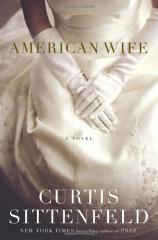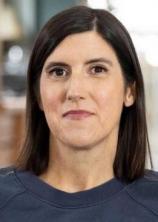American Wife
Review
American Wife
Let’s get this out of the way up front: If AMERICAN WIFE were nothing more than a barely disguised attempt to imagine and illuminate the inner life of Laura Bush, it might be entertaining in a titillating sort of way, but hardly worth more attention than a quickly forgotten magazine profile. In truth, Curtis Sittenfeld’s third novel is a rich and arresting portrait of an enduring marriage, of the inevitable compromises necessary to reach that longevity, and of the unremitting demands of public life and the price of fame.
Sittenfeld’s protagonist, Alice Lindgren, is born in a small Wisconsin town in 1946, the only child of a bank manager and a housewife. Her early years are unremarkable until a September night in 1963 when the car she’s driving on the way to a party collides with one driven by Andrew Imhof, a classmate with whom she’s moving toward a relationship. Andrew is killed, and the specter of his loss shadows Alice’s waking (and dreaming) life.
Alice falls into a relationship with Andrew’s older brother, Pete, and when she becomes pregnant, her grandmother takes her to Chicago for an abortion --- a decision that plays a central role in the novel’s denouement.
Sittenfeld fast forwards to Madison, Wisconsin in 1977, where Alice contentedly works as an elementary school librarian and dreams about buying a house. During a summer when she’s spending most of her time creating papier-mâchécharacters to decorate the library, she meets Charlie Blackwell, “someone who found his own flaws endearing and thus concealed nothing,” at a backyard barbecue. Charlie is the youngest of four sons of Harold and Priscilla (nicknamed “Maj,” short for “Majesty”) Blackwell. Harold is a former governor of Wisconsin and unsuccessful candidate for president in 1968, and the family owns a prosperous meatpacking business. Two of Charlie’s brothers work alongside him in the business, while one serves in Congress. But, as Charlie puts it, “Being a Blackwell is my full-time job.”
At first, Alice --- a registered Democrat with liberal political sympathies --- is put off (“money and Republicans and sausage did not strike me as a particularly tempting combination.”). But within six weeks, she and Charlie are engaged, and six weeks later they’re married. On the surface it’s an unlikely match: Alice is bright, self-aware and witty, an inveterate reader of serious novelists like Bellow and Nabokov, while Charlie prefers to spend his evenings with a beer and pretzels, stretched out on the couch watching a baseball game. The mystery of romantic love is on display here in all its oddity.
Charlie’s first foray into electoral politics as a candidate for Congress in 1978 results in a crushing defeat, and he retreats philosophically into the family business and life of a prosperous Milwaukee suburbanite. Ten years later, he’s a disgruntled 42-year-old, obsessed (to Alice’s annoyance) by his “legacy.” An offer to become a part owner of the Milwaukee Brewers and the public face of the team as its managing partner appears it may be enough to relieve his lethargy. But before long, he’s spending more of his time in increasingly frequent drinking bouts and behavioral lapses that move Alice to threaten divorce, especially after they attend a disastrous 20th reunion of Charlie’s Princeton class. Alice’s ultimatum abruptly ends Charlie’s drinking, and he undergoes a religious conversion at the hands of an evangelical preacher, Reverend Randy. Soon, he is elected governor of Wisconsin and is on the fast track to the White House. Still, Alice is ambivalent: “I wanted Charlie to win the election,” she comments wryly, “but I didn’t want him to be president.”
The final quarter of the book is set in June 2007. Blackwell, nearing the end of his second term, presides over an unpopular Middle East war, while trying to gain Supreme Court confirmation of a staunchly anti-abortion female judge. Alice, pro-choice and skeptical about the war, must face the contradictions in her public and interior lives --- and she does so in a moving and completely authentic fashion.
The well-known elements of the Bush story all are here, subtly altered to present them in a fresh and original way. But no writer, even one as adept as Curtis Sittenfeld, will ever unearth anything approaching the objective truth of George and Laura Bush’s relationship. What she has done, and what elevates this book to the realm of true art, is to create a nuanced portrait of how it feels to be the wife of a major political figure, or indeed any celebrity. Fulfilling Hemingway’s definition of a good story, AMERICAN WIFE feels “more true than what really happened.” That’s the highest compliment one can pay to this thoroughly absorbing novel.
Reviewed by Harvey Freedenberg on January 5, 2011
American Wife
- Publication Date: September 2, 2008
- Genres: Fiction
- Hardcover: 576 pages
- Publisher: Random House
- ISBN-10: 1400064759
- ISBN-13: 9781400064755





